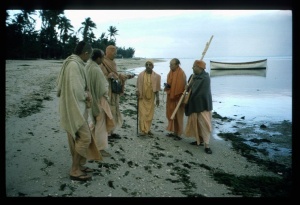SB 10.54.41: Difference between revisions
(Vanibot #0018 edit: make synonym terms in Sanskrit italic in SB - Vanisource) |
(Vanibot #0054 edit - transform synonyms into clickable links, which search similar occurrences) |
||
| Line 23: | Line 23: | ||
<div class="synonyms"> | <div class="synonyms"> | ||
''rājyasya'' | ''[//vanipedia.org/wiki/Special:VaniSearch?s=rājyasya&tab=syno_o&ds=1 rājyasya]'' — of kingdom; ''[//vanipedia.org/wiki/Special:VaniSearch?s=bhūmeḥ&tab=syno_o&ds=1 bhūmeḥ]'' — of land; ''[//vanipedia.org/wiki/Special:VaniSearch?s=vittasya&tab=syno_o&ds=1 vittasya]'' — of wealth; ''[//vanipedia.org/wiki/Special:VaniSearch?s=striyaḥ&tab=syno_o&ds=1 striyaḥ]'' — of a woman; ''[//vanipedia.org/wiki/Special:VaniSearch?s=mānasya&tab=syno_o&ds=1 mānasya]'' — of honor; ''[//vanipedia.org/wiki/Special:VaniSearch?s=tejasaḥ&tab=syno_o&ds=1 tejasaḥ]'' — of power; ''[//vanipedia.org/wiki/Special:VaniSearch?s=māninaḥ&tab=syno_o&ds=1 māninaḥ]'' — those who are proud; ''[//vanipedia.org/wiki/Special:VaniSearch?s=anyasya&tab=syno_o&ds=1 anyasya]'' — of something else; ''[//vanipedia.org/wiki/Special:VaniSearch?s=vā&tab=syno_o&ds=1 vā]'' — or; ''[//vanipedia.org/wiki/Special:VaniSearch?s=hetoḥ&tab=syno_o&ds=1 hetoḥ]'' — for the reason; ''[//vanipedia.org/wiki/Special:VaniSearch?s=śrī&tab=syno_o&ds=1 śrī]'' — in their opulence; ''[//vanipedia.org/wiki/Special:VaniSearch?s=mada&tab=syno_o&ds=1 mada]'' — by their intoxication; ''[//vanipedia.org/wiki/Special:VaniSearch?s=andhāḥ&tab=syno_o&ds=1 andhāḥ]'' — blinded; ''[//vanipedia.org/wiki/Special:VaniSearch?s=kṣipanti&tab=syno_o&ds=1 kṣipanti]'' — they commit insult; ''[//vanipedia.org/wiki/Special:VaniSearch?s=hi&tab=syno_o&ds=1 hi]'' — indeed. | ||
</div> | </div> | ||
Latest revision as of 19:26, 17 February 2024

A.C. Bhaktivedanta Swami Prabhupada
Please note: The synonyms, translation and purport of this verse were composed by disciples of Śrīla Prabhupāda
TEXT 41
- rājyasya bhūmer vittasya
- striyo mānasya tejasaḥ
- mānino 'nyasya vā hetoḥ
- śrī-madāndhāḥ kṣipanti hi
SYNONYMS
rājyasya — of kingdom; bhūmeḥ — of land; vittasya — of wealth; striyaḥ — of a woman; mānasya — of honor; tejasaḥ — of power; māninaḥ — those who are proud; anyasya — of something else; vā — or; hetoḥ — for the reason; śrī — in their opulence; mada — by their intoxication; andhāḥ — blinded; kṣipanti — they commit insult; hi — indeed.
Translation and purport composed by disciples of Śrīla Prabhupāda
TRANSLATION
[Again Balarāma addressed Kṛṣṇa:] Blinded by conceit with their personal opulences, proud men offend others for the sake of such things as kingdom, land, wealth, women, honor and power.
PURPORT
Lord Kṛṣṇa was originally meant to marry Rukmiṇī. All along this was the best arrangement for all concerned, and yet from the beginning Rukmī had maliciously opposed this beautiful arrangement. When his sister's desire was finally fulfilled and she was taken by Kṛṣṇa, he viciously attacked the Lord with vulgar insults and mortal weapons. In return Lord Kṛṣṇa tied him up and partially clipped his hair and mustache. While certainly humiliating for a puffed-up prince like Rukmī, his punishment was a mere slap on the wrist, considering what he had done.